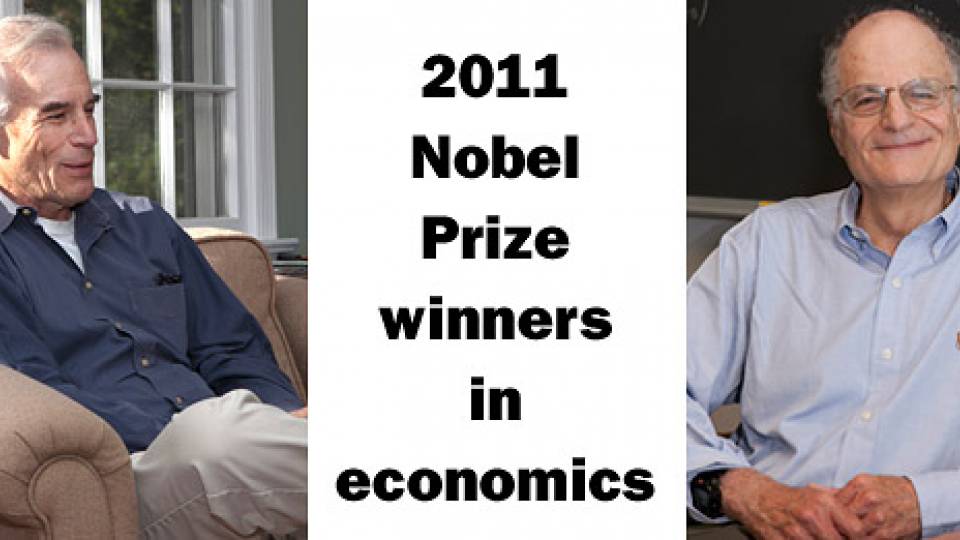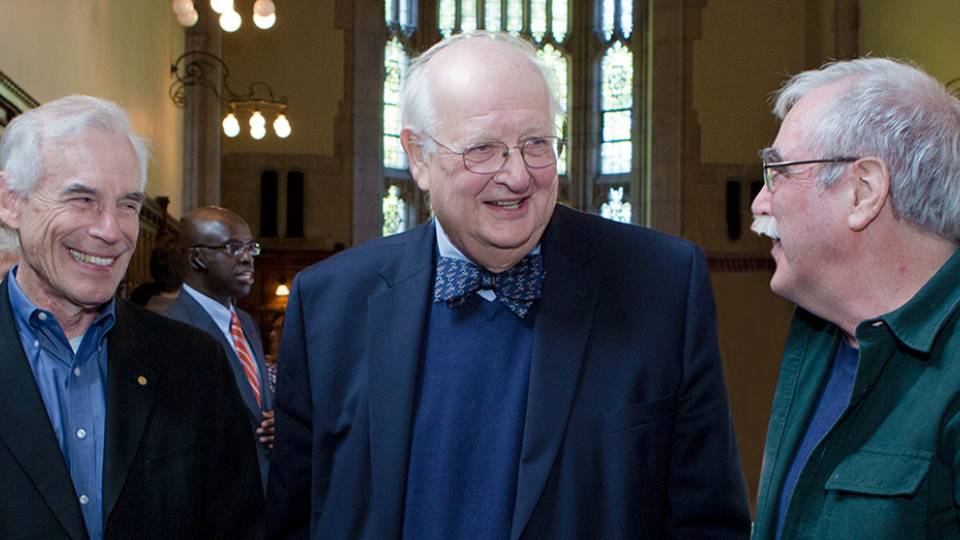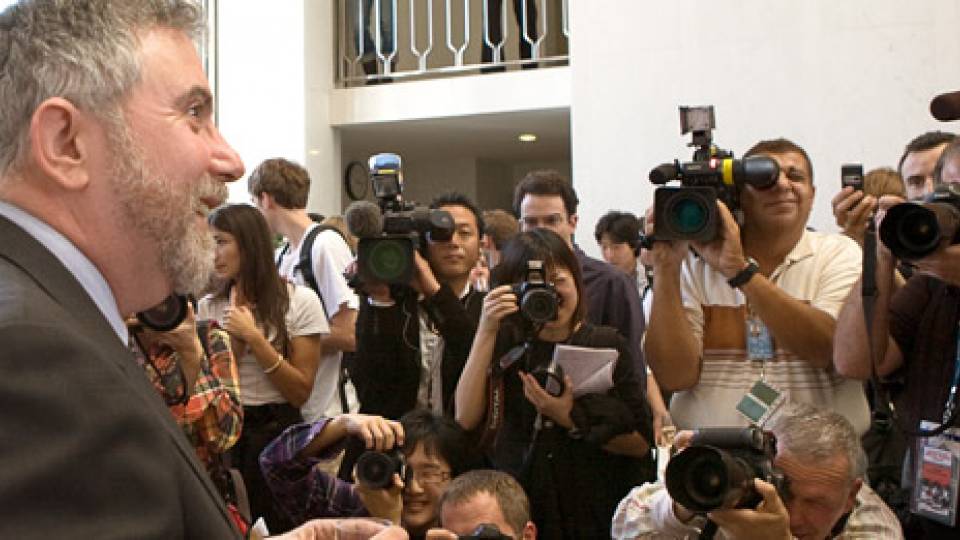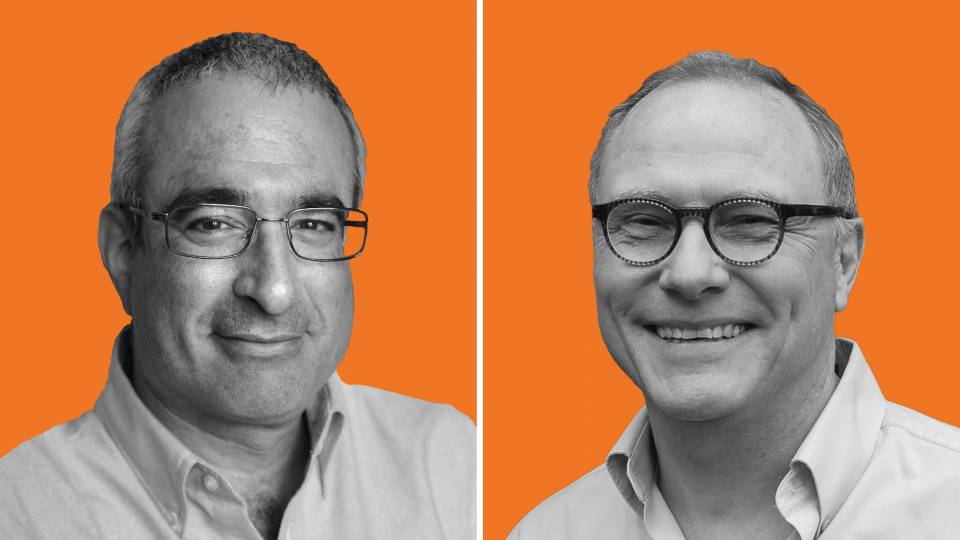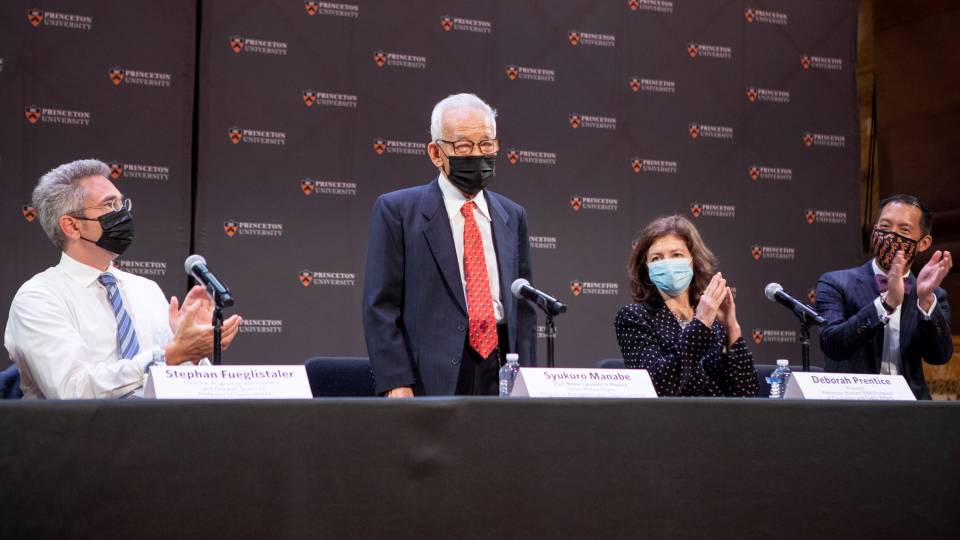A 40-year path of friendly arguments and groundbreaking studies of how governments weigh policies to deal with economic troubles has led a pair of prominent economists to share the 2011 Nobel Prize in their field.
Princeton University professor Christopher Sims was honored along with Thomas Sargent, a New York University economist and visiting professor this semester at Princeton, for developing tools to analyze the economic causes and effects of monetary policy. Their work has revolutionized the field of macroeconomics and how it is applied by central banks and governments around the world.
Sims, who is Princeton's Harold H. Helm '20 Professor of Economics and Banking, has been a faculty member at Princeton since 1999, and is the third tenured faculty member at Princeton to win the Nobel Prize in economics in the past decade. He and Sargent are longtime colleagues, and are currently teaching partners for a graduate course at Princeton.
The day was highlighted by the insistence of both men to proceed with teaching their classes -- while also accepting the worldwide interest in their research -- and lighthearted banter over their career-long history of disagreements within the field. Both Sims and Sargent remarked on the prize with humility.
"I couldn't be happier to be getting this prize, and especially to be getting it with Tom, who I've known a long time," Sims said at a news conference in Princeton's Richardson Auditorium. "I'm not so sure it's right to say we have worked together; it's more that we have a series of continuing arguments many of which are still going on as I slowly persuade him of the error of his earlier positions," Sims joked.
Sims lauded Sargent and other colleagues who have contributed to empirical studies of the relationships between the economy and government policymaking, as well as those who have applied that research to real-world policymaking.

Sims (left) enjoys a laugh during the news conference with his Nobel Prize co-winner Sargent. (Photo by Denise Applewhite)
"I also like to think of the award as representing an award for an approach to economics that insists on recognizing the uncertainty surrounding our theories and trying to deal formally with those uncertainties using the tools of statistics, and, out of that, to develop ideas and insights and models that can improve real economic decision-making," he said. "There are many, many people who have contributed to the growth of these areas of economics, many of them working now both in academic departments and in central banks and governments around the world, and I hope they all feel that this award is in part to them."

Watch a video of the reception honoring Nobel Prize in economics winners Christopher Sims and Thomas Sargent.
Said Sargent, "It's wonderful to have this field recognized, and for me, it's particularly heartwarming to share it with Chris." He also teased his colleague on a variety of topics -- such as their differing pronunciations of "econometrics" and Sims' critical comments in giving input on papers and in seminars -- concluding that Sims' critiques had improved his work.
"It's not a pleasant experience when you're going through it, but today it feels really pleasant," Sargent said.
Sims and Sargent were honored with the Nobel Memorial Prize in Economic Sciences in Memory of Alfred Nobel for their work in answering "questions regarding the causal relationship between economic policy and different macroeconomic variables such as GDP (gross domestic product), inflation, employment and investments," the Royal Swedish Academy of Sciences noted in announcing the award today.
"Economic-policy decisions are influenced by expectations about developments in the private sector," the Nobel announcement said. "The laureates' methods can be applied to identify these causal relationships and explain the role of expectations. This makes it possible to ascertain the effects of unexpected policy measures as well as systematic policy shifts."

From left, Princeton University Provost Christopher Eisgruber, Sims, Sargent, and Princeton University Vice President and Secretary Robert Durkee share a lighthearted moment at the Nobel Prize press conference. (Photo by John Jameson)
Sims joins two other tenured Princeton faculty members who have received a Nobel Prize in economics in the last decade, following Paul Krugman in 2008 and Daniel Kahneman in 2002. In total, 13 members of the current Princeton faculty (including emeritus and visiting professors) are recipients of the Nobel Prize.
Using historical data about economic events, Sargent and Sims have independently worked to develop and critique models that seek to analyze the cause and effects of monetary policy. The laureates' work has been largely based on the U.S. economy and has provided consistent results when applied to other economies.
"I am delighted that the exceptional scholarly work of Professor Sims and Professor Sargent has been recognized with a Nobel Prize," said Princeton President Shirley M. Tilghman. "Characteristically, on the day of the announcement they were both in the classroom teaching. Professor Sims is the third permanent member of our faculty in the past decade to win the Nobel Prize in economics, and Professor Sargent is the second visiting member to be so recognized. These recognitions pay tribute not only to these individuals, but to the leading role that Princeton plays in scholarship and teaching throughout the field of economics."

The Nobel Prize press conference honoring Sims and Sargent drew hundreds of members of the Princeton University community, as well as members of national and international news outlets. (Photo by John Jameson)
Sims and Sargent each taught individual classes in the morning just hours after learning of their awards, and they followed the afternoon news conference and a celebratory reception by heading to Fisher Hall to co-teach a graduate course on advanced macroeconomic theory.
Mark Watson, a Princeton professor of economics and public affairs and acting chair of the economics department, said of Sims and Sargent, "They've changed macroeconomics in the biggest way possible, and allowed us to credibly answer questions that we just couldn't have answered before."
Citing their work in evaluating cause and effect in macroeconomics, Watson said, "It's always difficult to sort out cause and effect when the effect feeds back on causes. Sims developed methods that allow us to look at data and tease out cause and effect, as though you were doing a controlled experiment."
At the news conference, which drew hundreds of colleagues, staff and students, Sims and Sargent fielded questions from local, national and international media on a range of topics, including: fiscal and monetary policies that should be adopted to boost the U.S., European and Chinese economies; how their work has influenced Latin American economies; the nature of their academic arguments; how the laureates learned that they had won the Nobel and what they planned to do with the prize money; the Occupy Wall Street protests; their current teaching and research; and whether the Nobel Prize was a vindication for modern macroeconomics.
Princeton Provost Christopher Eisgruber congratulated the laureates as he introduced them.
"The Nobel Prize recognizes achievements that are important both because of their extraordinary scholarly distinction and their contributions to human society," Eisgruber said. "Chris and Tom, your accomplishments exemplify in the best possible way what Princeton University and New York University seek to do through their research missions. I know that I speak for my colleagues here on the platform ... in saying that we feel very fortunate to have you here and that we are overjoyed to celebrate this moment with you."
New York University President John Sexton traveled to Princeton for the news conference and praised both economists as well.
"This is a great day for the world and it's a great day for our two universities. … Great universities work together, great minds work together for the advancement of humankind," Sexton said. "Congratulations to both of our laureates, and onward and upward together."
Sims and Sargent followed the news conference by meeting with colleagues and students at a reception, where Watson offered a champagne toast.

From left, Mark Watson, acting chair of Princeton's economics department, salutes Sargent and Sims at a reception honoring their 2011 Nobel Prize in economics. (Photo by Denise Applewhite)
"I'm just going to thank them on behalf of the profession for everything they've taught us and done for us," Watson said. "You want to copy these guys. They're excited about their latest paper, whatever it happens to be. That just rubs off on all of us in the department -- keeps the excitement high among all the faculty and all the students."
Krugman, who received the 2008 Nobel Prize in economics for his work on international trade, praised the laureates' work on his blog, and came to the reception to congratulate them on a day that, he said, is much like "an out-of-body experience."
Regarding the importance of the Nobel award for the University, Krugman said, "Princeton's is actually the best economics department in the world, but this is a bit of external validation of that."
Sims influences others -- without fanfare
When asked about the "fanfare" that greeted Sims at the first class he taught Monday, "Money and Banking," Sims had a ready reply.
"The precept has, I think, six students registered, five showed up. There wasn't that much fanfare," Sims said.
One of the students in the class was Daniel Lewis, a Princeton junior who is majoring in economics. Of the 30 students in the course, he also was among the handful of students randomly assigned to a precept with Sims.
"This is what it means to be at Princeton -- to have a precept with a Nobel Prize winner," Lewis said. "It's just amazing."

Sims greets students at the Nobel Prize reception in the Rockefeller College Common Room. (Photo by Denise Applewhite)
Sims, who is president-elect of the American Economic Association, came to Princeton in 1999 after teaching at Yale University, the University of Minnesota and Harvard University. He attended Harvard as an undergraduate and doctoral student, earning his Ph.D. in 1968 -- in the same class as Sargent. He began his work on analyzing monetary policy not long after.
"Ever since the Great Depression, most economists have been aware that things can go very wrong with the macroeconomy, and also we didn't completely understand why they go wrong or how to repair things when they do," Sims said. "I've always thought this was an important problem to work on, and very difficult and fascinating."
The Royal Swedish Academy specifically cited Sims' work on vector autoregression, a method Sims developed to analyze how the economy is affected by temporary changes in economic policy, such as an interest rate increase.
Regarding the impact of his research, Sims said, "The most extensive applications have been by central banks that are trying to work out the effects of monetary policy.
"Monetary policy tries to control inflation, and as a result interest rates tend to be high when inflation is high," he explained. "But we think that raising interest rates lowers inflation. The main contribution of this work is to provide a way to untangle the relationship between interest rates and inflation, so we can see what the effect of interest-rate policy changes are on the price level and inflation, and separate that from the reverse causality that makes central banks react to inflation by changing interest rates."
Lauding the depth of Sims' work and its widespread theoretical and practical applications, Sargent said, "It's had an influence on the way all macroeconomists and actually all empirical workers look at time series -- data evolving over time. I was fortunate to work with Chris early, and it had a huge impact on how I do my work."
Yet, noting that "there have been many other people who have contributed" to his areas of research, Sims said, "I think anyone who gets the Nobel Prize has to be a little bit embarrassed to be picked out when there have been so many people who have contributed."
Watson said that Sims "is one of the nicest guys in the world, and one of the best citizens we have in the department." Sims postponed the sabbatical he was set to take this year because the department needed him to teach an undergraduate course, Watson said.
"Sims has trained hordes of graduate students; he's a wonderful adviser. He brings out the best research in our students, and he cares and spends lots of time with them," Watson said.
One of his former graduate students, Eric Leeper, now a professor in the economics department at Indiana University, seconded those comments. He recalled that he and his fellow graduate students felt intimidated by studying with Sims, but that the feeling dissolved when Sims held a cookout for them at his house in Minneapolis in the mid-1980s. The distance between student and professor vanished when a tornado warning went off, and everyone crowded into Sims' basement, where they discussed Sims' interest in photography and other non-economics topics.
Leeper has since co-written papers with Sims.
"Chris has always been extraordinarily open-minded about research -- he's not an ideologue about methodology," Leeper said. "As a student of his, that open-mindedness had a strong influence on me, and sticks with me to this day. It comes in part from the realization that we don't have all the answers and we need to be fairly agnostic about how we approach research."
Sims clearly values an empirical approach to economics, and he was pleased to see the Nobel committee recognize it as well.
"I think they are trying to recognize that careful quantitative modeling of fiscal and monetary policy has become pervasive, and is very important and valuable," Sims said. "It is good to underline the importance of careful, quantitative research at this time when there are a lot of uncareful, wild ideas floating around about what's wrong with the economy and what to do about it."

Sargent delivers remarks to students, colleagues, media representatives and other attendees at the Nobel Prize reception. (Photo by Denise Applewhite)
Sargent focuses on two-way expectations
Sargent walked into his "Macroeconomic Theory" class Monday morning to sustained applause and hushed attention when he began speaking to the first-year graduate students in the course.
"You're paying much more attention to me today -- and it's the same stuff," Sargent said, tapping into the nervous excitement of his students.
Sargent is a visiting professor in Princeton's Department of Economics this fall and was a visiting professor at Princeton last year as well.
"In addition to doing path-breaking research, Sargent is an inspirational classroom teacher," Watson said. "Students leave his class so excited. He really turns graduate students on to macroeconomics. He's been doing that his entire career."
Sexton praised Sargent's contributions to the New York University community.
"I remembered in 2002, a year into my time as president, when Tom Sargent joined our faculty. I would just like to say this. If there were a Nobel laureate for simple mentorship and for sheer humanity, he might be winning those today as well. This is the complete package," Sexton said.

Following an afternoon news conference and a celebratory reception honoring their 2011 Nobel Prize in economics, Sims and Sargent headed to Fisher Hall to co-teach a graduate course on advanced macroeconomic theory. Here, Sims sits behind the students and joins them in taking notes on the topic of Sargent's lesson; the two professors share duties of leading class lectures and discussions. (Photo by Mahlon Lovett)
Sargent began his professorship at New York University after serving on the faculty at the University of Pennsylvania, the University of Minnesota, the University of Chicago and Stanford University. He received his undergraduate degree at the University of California-Berkeley and his graduate degree at Harvard.
Sargent is widely known for his work on coordinating monetary and fiscal policy, stabilizing inflation and fighting unemployment. In conferring his award, the Royal Swedish Academy focused on his work in structural macroeconomics, a method that can be applied to study how households and firms adjust their expectations at the same time as economic developments are taking place.
Sargent said he focuses on using "statistical methods to judge the success and failure of theoretical models that emphasize how people form expectations about government policies, and how those expectations influence what actually happens."
Sargent said the research that he and Sims have conducted has established useful tools that are used by monetary policymakers.
"It's used to characterize honestly what the data can say about how much uncertainty there is about the effects of policy," he said. "The data tell us we know some things and we don't know some other things. Central banks and treasuries are very interested in knowing what view of the world they can take … Chris and I have students at central banks all over the world, and they are applying this work."
Though Sargent and Sims have had their intellectual disagreements, "we each see the other as part of the same intellectual project," Sims said. They served together on the faculty of the University of Minnesota for more than a decade.
Richard Rogerson, a professor of economics and public affairs at Princeton's Woodrow Wilson School of Public and International Affairs, was a graduate student at the University of Minnesota in the same period that Sims and Sargent taught there. Sims and Sargent "were in the prime of their careers, but you could go knock on their doors and they would spend as much time as you wanted talking to you. They always had time to talk to students," Rogerson recalled. "These faculty were in a seminar room, interacting with each other and arguing about things. I was lucky just to be able to witness that."
Sims and Sargent will share the award of 10 million Swedish kronor (currently $1.5 million). The awards will be handed out Dec. 10, the anniversary of prize founder Alfred Nobel's death.
A video of the Oct. 10 news conference is available on Princeton's YouTube channel and also will be available on the Princeton Webmedia site.
Additional reporting by Jennifer Greenstein Altmann, Cass Cliatt, Eric Quiñones and Ruth Stevens.

